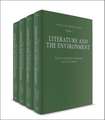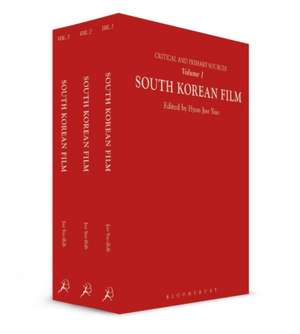South Korean Film: Critical and Primary Sources: Critical and Primary Sources
Editat de Professor Hyon Joo Yooen Limba Engleză Quantity pack – 8 sep 2021
Din seria Critical and Primary Sources
- 30%
 Preț: 4450.14 lei
Preț: 4450.14 lei - 28%
 Preț: 4443.54 lei
Preț: 4443.54 lei -
 Preț: 3406.98 lei
Preț: 3406.98 lei - 31%
 Preț: 4118.69 lei
Preț: 4118.69 lei - 14%
 Preț: 4150.79 lei
Preț: 4150.79 lei - 14%
 Preț: 4142.16 lei
Preț: 4142.16 lei - 14%
 Preț: 4393.92 lei
Preț: 4393.92 lei - 33%
 Preț: 4309.69 lei
Preț: 4309.69 lei - 33%
 Preț: 4285.73 lei
Preț: 4285.73 lei - 32%
 Preț: 4002.90 lei
Preț: 4002.90 lei - 31%
 Preț: 4121.69 lei
Preț: 4121.69 lei - 14%
 Preț: 4118.89 lei
Preț: 4118.89 lei - 44%
 Preț: 3181.30 lei
Preț: 3181.30 lei - 31%
 Preț: 3545.81 lei
Preț: 3545.81 lei - 31%
 Preț: 2938.36 lei
Preț: 2938.36 lei - 31%
 Preț: 4123.73 lei
Preț: 4123.73 lei - 31%
 Preț: 4116.39 lei
Preț: 4116.39 lei - 37%
 Preț: 3542.53 lei
Preț: 3542.53 lei - 14%
 Preț: 3907.70 lei
Preț: 3907.70 lei - 14%
 Preț: 3907.26 lei
Preț: 3907.26 lei
Preț: 2970.44 lei
Preț vechi: 4481.73 lei
-34% Nou
Puncte Express: 4456
Preț estimativ în valută:
568.37€ • 593.49$ • 469.36£
568.37€ • 593.49$ • 469.36£
Carte indisponibilă temporar
Doresc să fiu notificat când acest titlu va fi disponibil:
Se trimite...
Preluare comenzi: 021 569.72.76
Specificații
ISBN-13: 9781501322617
ISBN-10: 1501322613
Pagini: 3
Dimensiuni: 241 x 171 x 91 mm
Greutate: 2.4 kg
Editura: Bloomsbury Publishing
Colecția Bloomsbury Academic
Seria Critical and Primary Sources
Locul publicării:New York, United States
ISBN-10: 1501322613
Pagini: 3
Dimensiuni: 241 x 171 x 91 mm
Greutate: 2.4 kg
Editura: Bloomsbury Publishing
Colecția Bloomsbury Academic
Seria Critical and Primary Sources
Locul publicării:New York, United States
Caracteristici
Covers both historical and critical approaches that situate films of each era in local, regional, and global contexts, encompassing issues of auteur-ship, genre, spectatorship, gender, and nation
Notă biografică
Hyon Joo Yoo is Associate Professor of Film and Television Studies at The University of Vermont, USA. She is the author of Cinema at the Crossroads: Nation and the Subject in East Asian Cinema (2012) and co-editor of The Trans-Pacific Imagination: Rethinking Boundary, Culture and Society (2012).
Cuprins
I. Modernity in Golden Age South Korean Cinema Soyoung Kim "Questions of Woman's Film: The Maid, Madam Freedom, and Women" in Postcolonial Classics of Korean Cinema. Ed. C. Choi. Irvine: Korean Film Festival Committee at the UC Irvine (1998). Kelly Jeong "Nation Rebuilding and Postwar South Korean Cinema: The Coachman and The Stray Bullet" in Kelley Jeong Crisis of Gender and the Nation in Korean Literature and Cinema: Modernity Arrives Again, Lexington Books (2010). Steven Chung "Regimes within Regimes: Film and Fashion in the Korean 1950s" in The Korean Popular Culture Reader, ed. Young-min Choe and Kyung Hyun Kim, pp.103-125, Duke University Press (2013). Chris Berry "Scream and Scream Again: Korean Modernity as a House of Horrors in the Films of Kim Ki-young" in Seoul Searching: Culture and Identity in Contemporary Korean Cinema. Ed. Frances Gateward. Albany: SUNY Press (2007). II. New Korean Cinema Kyung Hyun Kim "Lethal Work: Domestic Space and Gender Troubles in Happy End and The Housemaid" in South Korean Golden Age Melodrama: Gender, Genre, and National Cinema. Eds. Kathleen McHugh & Nancy Abelmann. Wayne State University Press (2005). Kyung Hyun Kim "Virtual Landscapes: Soponje, The Power of Kangwon Province, and The Host" in Kyung Hyun Kim Virtual Hallyu: Korean Cinema of the Global Era. Duke University Press (2011). Hyon Joo Yoo "Transnational Cultural Production and the Politics of Moribund Masculinity" in positions: east asia cultures critique, vol.16, no.3 (2008). Hyon Joo Yoo "The Incurable Feminine: Women without a Country in East Asian Cinema" in The Trans-Pacific Imagination: Rethinking Boundary, Culture and Society. Eds. Naoki Sakai & Hyon Joo Yoo. World Scientific Publishing (2012). Youngmin Choe "Postmemory DMZ in South Korean Cinema, 1999-2003" in The Journal of Korean Studies, vol. 18. no.2 (2013). Jinhee Choi "Blockbusters, Korean Style" in Jinhee Choi The South Korean Film Renaissance. Wesleyan University Press (2010).III. South Korean Auteurs in a Global Era David E. James "Im Kwon-Taek: Korean National Cinema and Buddhism" in Im Kwon-Taek: The Making of a Korean National Cinema. Eds. David E. James & Kyung Hyun Kim. Wayne State University Press (2002). Todd McGowan "Affirmation of the Lost Object: Peppermint Candy and the End of Progress" in symploke, vol 15, no.1-2 (2007). Hye Seung Chung "Beyond 'Extreme': Re-reading Kim Ki-duk's Cinema of Ressentiment" in Journal of Film and Video, vol 62, no.1-2 (2010). David Scott Diffrient "The Unbearable Lightness of Hong Sang-soo's HaHaHa: Awkward Humor, Nervous Laughter, and Self Critique in Contemporary Korean Comedy" in New Review of Film and Television Studies, vol. 12, no. 1, (2014). Joseph Jonghyun Jeon "Residual Selves: Trauma and Forgetting in Park Chan-wook's Oldboy" in positions: east asia cultures critique, vol 17. No.3 (2009). Christina Klein "Why American Studies Needs to Think about Korean Cinema, or, Transnational Genres in the Films of Bong Joon-ho" in American Quarterly, vol. 60, no.4 (2008). Michelle Cho "Genre, Translation, and Transnational Cinema: Kim Jee-woon's The Good, the Bad, the Weird" in Cinema Journal, vol.54, no.3 (2015).
